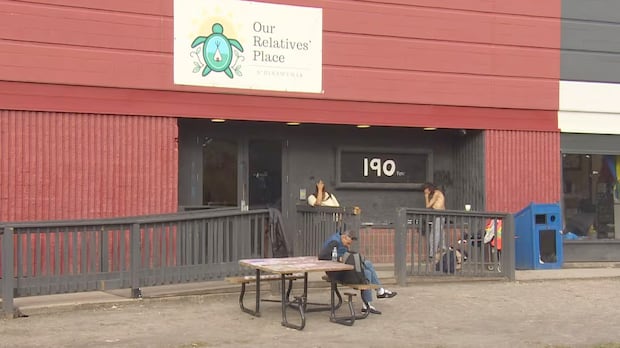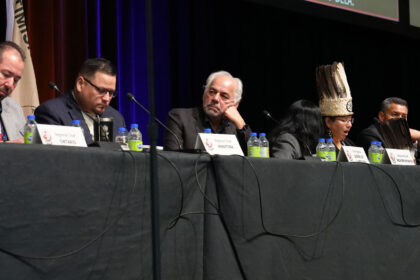The Manitoba government’s proposal to triple the detention time for intoxicated people received scathing criticism at a public meeting Thursday night, with some calling it an abuse of government power and a violation of rights.Others said the plan, which is supposed to take effect on Nov. 1, has been rushed and is not ready.”Detaining individuals for substance use involuntarily is a harmful and ineffective response, and actually increases the risk of fatal overdose,” Lorie English, executive director of the West Central Women’s Resource Centre, told a meeting of the government’s standing committee on social and economic development Thursday night.”We firmly believe that the proposed changes to this legislation will result in the deaths of Manitobans.”The NDP government hopes to open a “protective care centre” at 190 Disraeli Fwy., and Addictions Minister Bernadette Smith has tabled Bill 48, the Protective Detention and Care of Intoxicated Persons Act, to extend the length of time a detox centre can hold someone intoxicated on methamphetamine or other drugs.It would replace the current Intoxicated Persons Detention Act, which limits detention to 24 hours. It was put in place a long time ago to deal with alcohol intoxication, not the substances widely available now that require longer treatment, the government has said. A bill needs to pass readings to become law. Smith’s passed first and second reading two weeks ago, and was referred to the committee for further consideration.A 6½-hour meeting of the committee ran until nearly 12:30 a.m. Friday, hearing from 24 speakers and receiving another 20 written submissions .After getting support from the city’s police chief and several medical professionals in the past two weeks, the bill was met with a heavy dose of opposition at the meeting.”Detaining people against their will for 72 hours constitutes a violation of fundamental human rights, including the right to autonomy and freedom from arbitrary detention,” said English, who echoed the comments made by many other nonprofit organizations.Levi Foy, executive director of Sunshine House, and Kate Sjoberg, executive director of Resource Assistance for Youth, both said the bill further stigmatizes and criminalizes substance use.”[It] empowers a system that treats our communities as dangers and an inherent threat to safety,” Foy said.Levi Foy, seen in a photo from 2024, says it’s impossible to legislate drug use out of our existence and “we all need to rethink our relationship with substance use.” (Alana Cole/CBC)There has been a “steamrolling of rights and freedoms” around the world, and Bill 48 continues that with “poor definitions of safety and manufactured ideas of danger,” Foy said.Of the 111,539 visits to the programs and services offered by Sunshine House in 2024 — including the mobile overdose prevention site — there were only 11 incidents of violence.”I would like everyone on this committee to reflect on those numbers,” Foy said.Others said the bill risks creating a system where people can be detained without having committed a crime simply because it’s convenient, not because it’s necessary.Both English and Sjoberg said the bill isn’t based on evidence or grounded in harm reduction.Evidence shows that forced withdrawal and treatment does not lead to sustained recovery,” English said. “Rather, it increases likelihood of overdose after release due to a reduced drug tolerance.” A person detained for three days will sober up but still have an addition, Foy said, adding that once released they will try to “catch up” with the level of intoxicated friends, increasing their risk of overdose.A used needle lies on a rainy street in Winnipeg in an undated image. (Bert Savard/Radio-Canada)Joseph Fourre, a former crystal meth addict who founded the Singing Red Bear Foundation to talk to youth about the dangers of drugs, said detention is only one step of what should be “a recovery strategy model” followed up by two to three weeks of detox.“This bill is just all about harm reduction with the hopes of recovery, if they so choose to,” said Fourre, whose 31-year-old son died of a fentanyl poisoning in 2023.“This bill can be better,” he said, asking the committee to postpone it “until we can get it right.”Foy and English expressed concern with how quickly everything has moved.“It was surprising to me that this kind of space could be mobilized in the rapid timeframe that it is, despite the fact that we are still waiting on movement on a supervised consumption site two years after the mandate was issued,” English said.The city has a lack of detox and treatment beds for those voluntarily seeking treatment, so “it feels somewhat counterintuitive to force someone into withdrawal before we even have options available to offer further support,” she added.Instead of jumping to increased detention powers, Foy suggested putting the resources into mobile crisis outreach and supervised consumption services, which he and English say are more compassionate approaches.“It is impossible to legislate drug use out of our existence. We all need to rethink our relationship with substance use,” Foy said.Several speakers cited little or no consultation with agencies with expertise in working with those who use drugs. Smith, whose sister died of an overdose, insisted medical experts and those with lived experience have been consulted “and they’ve told us that this is the right direction to go.” “This is very personal for me. This is not something I take lightly,” she added, asking people to “open their hearts” to those who need support.Nick Kasper, president of United Fire Fighters of Winnipeg, spoke in favour of the bill, saying he has spent much of his career witnessing the loss and devastation caused by addiction.“Bill 48 recognizes the humanity of these patients while giving health-care providers the tools and time … to keep them alive long enough to receive treatment and support. It’s an update long overdue,” he said.Mitch Bourbonniere, community activist and founding member of the Bear Clan patrol, also spoke in favour, saying “our society already detains people for 72 hours who have psychosis due to mental illness, why would we not afford the same protection to those who have psychosis because of meth use?”It is inhumane that we allow people with meth psychosis to battle imaginary demons on our streets, suffering with haunted tormented and tortured minds. We must intervene. We must protect them and others.”Karen Sharma of the Manitoba Human Rights Commission said more information is needed on why the detention period needs to be extended and why existing mechanisms, like the Mental Health Act, aren’t enough.If there is a good base of evidence, make it publicly available “so we can really get a good understanding of the basis of the bill,” she said.Michael Dyck of the Manitoba Bar Association was concerned by “a lack of details” in the bill’s wording, particularly around guarantees a person won’t be re-detained immediately after the 72 hours is up.He and Sharma insisted the wording be clear that detainees be informed of their rights to legal representation, why they are being held, and how they will be treated.
Thursday, 5 Mar 2026
Canada – The Illusion
Search
Have an existing account?
Sign In
© 2022 Foxiz News Network. Ruby Design Company. All Rights Reserved.
You May also Like
- More News:
- history
- Standing Bear Network
- John Gonzalez
- ᐊᔭᐦᑊ ayahp — It happened
- Creation
- Beneath the Water
- Olympic gold medal
- Jim Thorpe
- type O blood
- the bringer of life
- Raven
- Wás’agi
- NoiseCat
- 'Sugarcane'
- The rivers still sing
- ᑲᓂᐸᐏᐟ ᒪᐢᑿ
- ᐅᑳᐤ okâw — We remember
- ᐊᓂᓈᐯᐃᐧᐣ aninâpêwin — Truth
- This is what it means to be human.
- Nokoma











